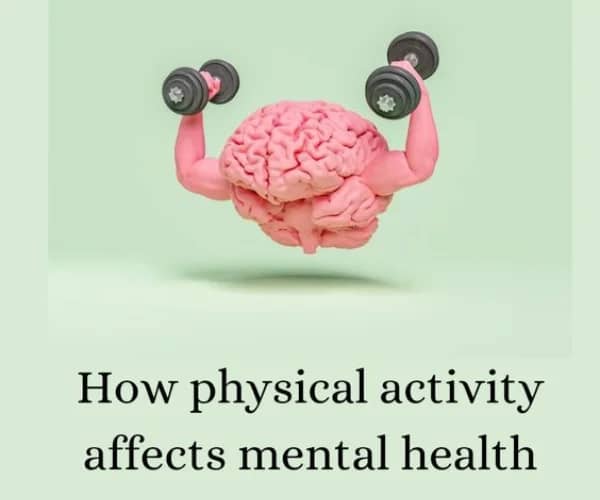Introduction
Maintaining good physical and mental health is crucial. Exercise not only helps you to achieve the desired body figure but also plays a major role in preventing and treating mental disorders.
Physical activity is something very effective in treating many mental disorders, improving mood, and increasing the effectiveness of thought processes. Below are eight examples of the ways that exercise positively affects your mental health, as evidenced by scientific studies and personal experiences.
Reduces Symptoms of Depression
Research has suggested that physical activity effectively leads to a decrease in symptoms of depression. Aerobic exercise releases endorphins in the body, which are known as natural mood enhancers. These chemicals produce mood-enhancing effects and a sense of well-being, commonly known as the ‘runner’s high’. Besides medical treatments like medication and therapy, exercise can be an effective way to manage depression.
Alleviates Anxiety
Exercise is one of the natural remedies that can be used to cure anxiety or reduce its effects. Exercise reduces tension and stress, replenishes physical and mental energy, and improves overall well-being through the release of endorphins. Exercise also stimulates the release of gamma-aminobutyric acid (GABA), which develops in the brain and decreases anxiety.
Performing exercises like jogging, swimming, dancing or activities with repeated body movements may be of benefit in bringing anxiety levels down. Trampolines are among the new trends at the moment in physical fitness, utilizing a series of enjoyable activities to stay fit. A good bungee rebounder can be your next favorite exercise tool that not only takes focus away from anxious thinking but also helps create a relaxing, energetic atmosphere.
Reduces Emotional Stress
One of the best ways to improve your mood is to exercise physically on a daily basis. Exercise prompts the brain to release chemicals that can make you feel happier, more relaxed, and less anxious. Research has indicated that regular exercise can lead to positive changes in mood and emotions, making it an effective way to combat stress and related issues.
Aside from the chemical changes, exercise entails relating to and attaining goals, which improve self-esteem and provide direction. Whether it is the finish line of a marathon or the consistent follow-through of exercising daily, the feeling of accomplishment and movement can enhance emotional health tremendously. This positive reinforcement is beneficial in helping the person develop personal strength, and create a more positive perspective to life.
Enhances Cognitive Function
Physical activity is not only a plus for physical health; it also has a significant impact on the mind. Exercise enhances blood circulation in the brain, promotes the creation of new neurons, and improves cognitive function. These changes in brain structure can result in improved memory, fast thinking, and also a decrease in the likelihood of developing degenerative brain disorders in the future.
Additionally, exercise has been shown to increase levels of brain-derived neurotrophic factor (BDNF), which supports neuron growth and function. This increase in BDNF has been linked to better learning abilities, memory, and optimal brain function in general. Choosing a regular physical activity and engaging in it is a proven way to improve the productivity of your brain in the long run.
Helps with Stress Management
Stress management is best done by exercising. Daily exercises also help to produce endorphins, a chemical that reduces pain and produces a feeling of well-being. These endorphins bind with receptors in the brain to minimize the feeling of pain and generate a good vibe in the physical system, just like morphine. Furthermore, exercise helps to reduce levels of stress hormones such as adrenaline and cortisol in the body.
Things such as yoga, tai chi, or even a nature walk can go a long way in relieving stress. These activities help develop awareness of the present moment, reduce stress and anxiety, and enhance the general mood. Exercising daily will help a person build new ways of handling stress, thus making a positive impact on the mental health of an individual.
Boosts Self-esteem and Confidence
One of the best things about exercising is the way it is able to boost the self-esteem and confidence of an individual. Getting to the set fitness goals, however general or specific can be a fulfilling experience and therefore improves self-esteem. Regular exercise also reduces the likelihood of developing a negative body image, which can boost self-esteem. After exercising, one gets to experience changes in the physical self and this may lead to a more positive attitude towards the self.
However, regular exercise promotes the feeling of belonging, particularly for people who exercise in groups and in teams through group exercises and team sports. This social aspect of exercise can give further emotional support as well as enhance the mood and self-esteem of the client. Regular exercise can help add value to your life and make you feel more capable and more certain in yourself.
Promotes Better Sleep
Proper sleeping is very important for mental health and exercise is also known to enhance sleep quality. Exercise advances the quantity of time that is spent in stage three and stage four, which is the most restorative sleep stage. This deeper sleep phase helps enhance the body’s immune system, strengthening the heart muscle, and managing stress and anxiety. Also, exercise assists in synchronizing the natural clock of the body to help sleep at night and wake in the morning.
Physical activity also appears to positively impact sleep quality and morning alertness. Yoga and stretching are among the best activities that can be undertaken since they help in relaxing one’s muscles and preparing the body for sleep.
Provides Social Interaction
In this case, exercise presupposes some sort of social interaction in the form of group classes, team practice, or exercising with a partner. These social relations may afford companionship, help in coping with feelings of loneliness and isolation, and enhance psychological well-being. Involvement in a community and receiving support multiple times can enhance the ability to effectively manage stress and life challenges.
Group exercise activities also create more motivation and accountability as it is harder to give up on a program if you are working with a group. Being in a group increases your chances of Staying motivated and the sense of belonging that comes with the group can help to improve your mood. Regular exercise in the social context thus offers benefits for both the physical and the mental health of the individual.
FAQs
For what level and duration of physical activity is there improvement in mental health?
The physical activity guidelines are a minimum of 150 minutes of moderate-intensity physical activity or 75 minutes of vigorous physical activity per week. Some exercise scientists suggest that any amount of exercise at all is better than none at all, so try to find what exercise regimen suits you and then stay with it.
Which activities are beneficial for mental health?
A: Strengthening and aerobic exercises are most beneficial, and anything from running and swimming to yoga and weightlifting can be beneficial to mental health. This ensures that you easily maintain consistency in the chosen activities by developing an interest in them.
Is it possible to rely on exercise instead of medicine for mental health issues?
Though exercise has been known to have a positive impact on mental health, it should not be used as a cure for severe mental illnesses. One should always seek medical advice and build a treatment plan that could entail drug use, counseling, and other changes.
Conclusion
Finally, physical activity should be incorporated into a daily routine because it promotes mental health through preventing, alleviating, and treating depression, anxiety, and other mental disorders as well as enhancing cognitive functioning and self-esteem among individuals. Making physical activity a part of your lifestyle improves your health and quality of life, and the tips in this article can help you get started.


Your article helped me a lot, is there any more related content? Thanks!